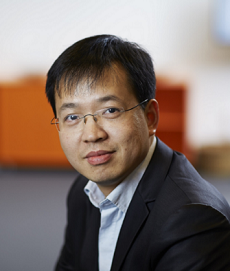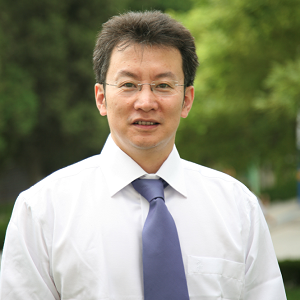 Prof. Yan Zhang
Prof. Yan Zhang
University of Oslo, Norway
IEEE Fellow, Member of Academia Europaea
Title: Digital Twin for 6G and IoT
Bio:
Yan Zhang (Fellow, IEEE) received the B.S. degree from Beihang University, Beijing, China, the M.S. degree from the Nanjing University of Post and Telecommunications, Nanjing, China, and the Ph.D. degree from the School of Electrical and Electronics Engineering, Nanyang Technological University, Singapore. He is currently a Full Professor with the Department of Informatics, University of Oslo, Oslo, Norway. His research interests include next-generation wireless networks leading to 6G and green and secure cyber-physical systems (e.g., smart grid and transport).
Dr. Zhang is a Fellow of the IET, and an Elected Member of Academia Europaea (MAE), the Royal Norwegian Society of Sciences and Letters (DKNVS), the Norwegian Academy of Technological Sciences (NTVA), the CCF Technical Committee of Blockchain, and 2019 CCF Distinguished Speaker. In 2018, he was a recipient of the global “Highly Cited Researcher” Award (Web of Science top 1% most cited worldwide). He is the symposium/track chair of a number of conferences, including IEEE ICC 2021, IEEE SmartGridComm 2021, and IEEE GLOBECOM 2017.
He is the Chair of IEEE Communications Society Technical Committee on Green Communications and Computing (TCGCC). He is an Editor (or Area Editor, Senior Editor, an Associate Editor) for several IEEE TRANSACTIONS/magazine, including IEEE Network Magazine, IEEE TRANSACTIONS ON NETWORK SCIENCE AND ENGINEERING, IEEE TRANSACTIONS ON VEHICULAR TECHNOLOGY, IEEE TRANSACTIONS ON INDUSTRIAL INFORMATICS, IEEE TRANSACTIONS ON GREEN COMMUNICATIONS AND NETWORKING, IEEE COMMUNICATIONS SURVEY & TUTORIALS, IEEE INTERNET OF THINGS JOURNAL, IEEE SYSTEMS JOURNAL, IEEE Vehicular Technology Magazine, and IEEE BLOCKCHAIN TECHNICAL BRIEFS. He is a Distinguished Lecturer of IEEE Communications Society and a Distinguished Speaker of IEEE Vehicular Technology Society. He was also a Distinguished Lecturer of IEEE Vehicular Technology Society from 2016 to 2020.
Abstract:
In this talk, we mainly introduce our recent studies on Digital Twin for 6G. We will first present Digital Twin concepts and models; as well as our proposed new research paradigm DITEN (Digital Twin Edge Networks) in 6G. Then, we focus on research problems related to: (i) communication-efficient federated learning for DITEN; (ii) reduced latency Blockchain and federated learning for DITEN; and (iii) edge association as a new unique research challenge in Digital Twin for 6G. Finally, we point out open research questions for further study.
 Prof. Bin Hu
Prof. Bin Hu
Lanzhou University, China
Editor-in-Chief for IEEE Transactions on Computational Social Systems, IET Fellow
Title: Computational Psychophysiology Based Pervasive Technologies for Mental Health
Bio:
Dr. Hu was elected as a Fellow of the Institution of Engineering and Technology (IET). He was a recipient of many research awards, including the 2014 China Overseas Innovation Talent Award, the 2016 Chinese Ministry of Education Technology Invention Award, the 2018 Chinese National Technology Invention Award, and the 2019 WIPO-CNIPA Award for Chinese Outstanding Patented Invention. He is also the TC Co-Chair of computational psychophysiology in the IEEE Systems, Man, and Cybernetics Society (SMC), the TC Co-Chair of cognitive computing in IEEE SMC, and the Vice-Chair of the TC 9.1. Economic, Business, and Financial Systems on Social Media at the International Federation of Automatic Control (IFAC). He is also a Member-at-Large of the ACM China Council and the Vice-Chair of the China Committee of the International Society for Social Neuroscience. He serves as the Editor-in-Chief for IEEE TRANSACTIONS ON COMPUTATIONAL SOCIAL SYSTEMS and an Associate Editor for IEEE TRANSACTIONS ON AFFECTIVE COMPUTING.
Abstract:
Computational psychophysiology is a new direction that broadens the field of psychophysiology by allowing for the identification and integration of multimodal signals to test specific models of mental states and psychological processes. Additionally, such approaches allows for the extraction of multiple signals from large-scale multidimensional data, with a greater ability to differentiate signals embedded in background noise. Further, these approaches allows for a better understanding of the complex psychophysiological processes underlying brain disorders such as autism spectrum disorder, depression, and anxiety. Given the widely acknowledged limitations of psychiatric nosology and the limited treatment options available, new computational models based pervasive technologies may provide solutions for multidimensional diagnostic systems and potentially new treatment approaches.

